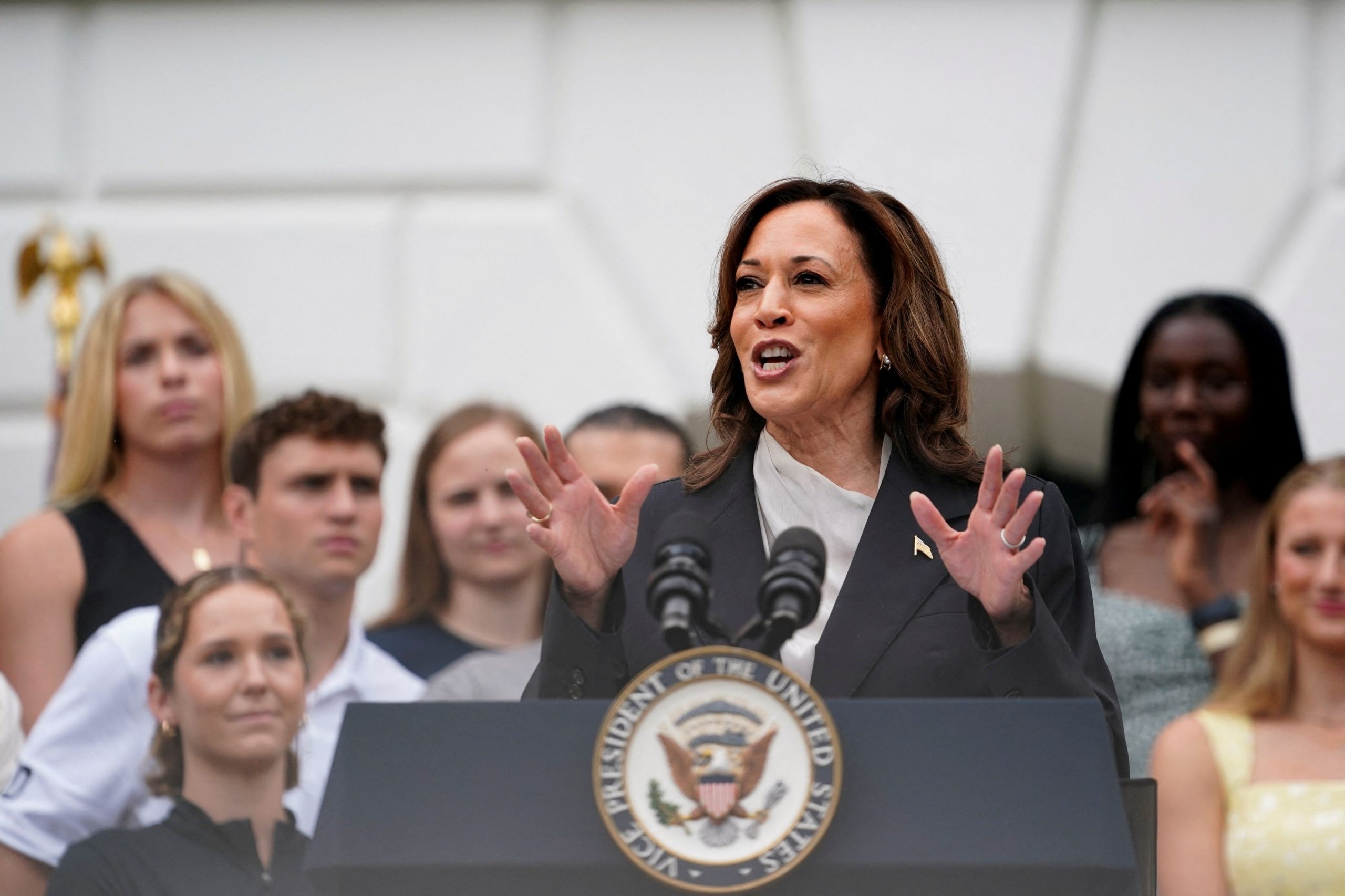Ahead of a lunch meeting with Vice President Kamala Harris at the White House in March, JPMorgan Chase Chief Executive Jamie Dimon didn’t know what to expect.
Dimon wasn’t sure of her political agenda when it came to the economy and business. His previous interactions with Harris had been limited, though the pair had a testy back-and-forth nearly a decade earlier while she was California attorney general during the mortgage foreclosure crisis.
He came away from the White House meeting thinking that Harris had been reasonable and open to improving how government and corporations can work together, according to people familiar with the discussion.
Harris’s emergence as the likely Democratic nominee since President Biden bowed out of the race Sunday has put the focus on the vice president’s policy views and governing style. Given her brief time in the Senate and early end to her presidential bid, Dimon and others have said they have known little about her positions, which has opened her up to Republicans casting her as a radical liberal over the last four years. She also struggled to craft a consistent campaign message when she ran for president herself, leaving her critics to argue her policy positions are rooted in political expediency.
“There was a little confusion coming out of the 2020 Democratic primary, but I think 3½ years of service in the Biden White House has clarified that,” said Matt Bennett of centrist think tank Third Way. “She has been the kind of pragmatic moderate that we saw when she was in California and in the Senate.”
If she wins the party’s nomination, Harris would be unlikely to dramatically alter the policy positions adopted by the Biden-Harris campaign so close to the election, some of her allies say. She has already been traveling the country campaigning on the administration’s policies, centering her message on abortion rights—and the democratic freedoms her party says would be under threat if Republican presidential nominee Donald Trump wins another term this fall.
The Trump campaign has signaled it will not only attack Harris for her time as vice president, but also her record in California politics, including as attorney general. “Harris will be even WORSE for the people of our Nation than Joe Biden,” Trump senior advisers Chris LaCivita and Susie Wiles said in a Sunday statement. “They own each other’s records, and there is no distance between the two. Harris must defend the failed Biden Administration AND her liberal, weak-on-crime record in CA.”
A representative for Harris didn’t respond to a request for comment.
Unlike Biden, Harris’s national profile was built based on her legal experience—not on major policy proposals or legislative dealmaking. She first caught the attention of Democratic activists and major donors through her aggressive questioning of Trump administration nominees.
Also in contrast with the president, who throughout his long political career aligned himself with the center of the Democratic Party, Harris’s views haven’t been as clearly defined on ideological lines.
Harris forms her opinions after detailed deliberations, according to people who have worked with her over the years, and has been reluctant to always endorse immediate, sweeping policy changes.
“She really wants to understand what the data and evidence is to support a potential course of action,” said Jill Habig, who worked for Harris in different roles, including policy director for her Senate campaign. “She really wants to understand not just the idea in theory, but how it’s actually going to work in practice. She often says, ‘Talk me through, how is this going to hit the streets?’ How does it actually work for real people in their busy lives?”
During the 2020 presidential primary that focused heavily on policy specifics with candidates aligning clearly with either the progressive or moderate wing of the party, Harris pitched herself as the bridge between the two, with an endorsement of liberal ideas but plans that were less far-reaching.
On Wall Street, however, she earned a reputation as a progressive firebrand in part because of how she prosecuted big banks for their roles while acting as attorney general of California between 2011 and 2017. She sued banks such as JPMorgan Chase, Bank of America and Citigroup as well as major credit ratings firms like Standard & Poor’s, and most of the firms settled the litigation and paid the state hundreds of millions of dollars.
Deanne Millison, the vice president’s former chief economic adviser, said Harris would take on corporations when needed, but also could work with them. “She would always remind us that the problems we’re trying to solve are too big for the government alone,” Millison said. She pointed to the private sector funding Harris raised in the administration’s efforts to invest in Central America and address causes of migration.
Biden and Harris have had some policy differences in the past. Their divergence has been based in part on the two Democrats’ varying life experiences and overall approach to policymaking.
Those who have worked with her say Harris, the first Black and female vice president and daughter of immigrants, puts an emphasis on the impact of policy decisions through the lens of women, children and minority communities. She has been a major supporter of reproductive rights policy throughout her career. She continued to be a leader on abortion rights in the administration after the Supreme Court in 2022 overturned Roe v. Wade, which had established a constitutional right to an abortion. She has also advocated for policies to address climate change, housing affordability and criminal justice reform.
Biden, who refers to himself as “Middle-Class Joe,” has been known to tailor his policy views to the middle-class and organized labor. His policies—although at times incremental—have focused on lowering some costs for Americans, including on prescription drugs and canceling some student debt during his presidency. As a foreign policy veteran, Biden in recent years has also put an emphasis on strengthening democracies against autocracies, portraying Trump as a threat to democracy.

People walk past paintings of U.S. President Joe Biden and Vice President Kamala Harris after Biden announced he was dropping his re-election bid, on a street in Mumbai, India, July 22, 2024. REUTERS/Francis Mascarenhas
The main policy areas with some daylight between Biden and Harris have been healthcare, trade, climate and taxes.
As a senator, Harris supported Medicare for All, which would shift the healthcare system from private and employer-based insurance to a government-run program. But in 2020, during her run for the White House, she released a more moderate proposal to expand access to Medicare while keeping private insurance intact. And since joining Biden’s presidential ticket, Harris has backed his plan, which calls for building on the Affordable Care Act.
On trade, Harris opposed two recent major trade deals that Biden supported, the U.S.-Mexico-Canada Agreement and the Trans-Pacific Partnership. Harris was one of just 10 senators who voted against the USMCA, a renegotiated version of the North American Free Trade Agreement under the Trump administration, arguing the environmental provisions were insufficient. She also opposed TPP as a Senate candidate, arguing it didn’t do enough to protect the environment and worker regulations.
Harris’s climate record has arguably been the most liberal part of her policy portfolio. She has backed the Green New Deal and supported banning fracking. Biden ran on a fracking ban, but only for oil and gas production from federal lands. As president, Biden did more to address climate change than any of his predecessors spending $1 trillion in tax credits, grants and loans for clean energy.
As a presidential candidate, Harris proposed a full repeal of the 2017 tax cuts enacted by Trump and congressional Republicans. Biden as a candidate and as president has backed leaving in place the tax cuts for people making under $400,000 and fully paying for those extensions with new taxes on companies and high-income households. During her campaign, she also favored raising estate taxes.
While in the Senate, she proposed an expansive tax credit for lower-income and middle-income workers worth up to $3,000 for individuals and $6,000 for married couples. That idea, worth more than $2 trillion over a decade, would have tilted the tax code to be much more progressive. It didn’t make it into the Biden agenda, though it has some similarities to the child tax credit that was in place for 2021.



